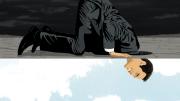In the early 2000s, a riptide of business scandals toppled Enron, Arthur Andersen, and WorldCom. In the aftermath, says Straus professor of business administration Max Bazerman, “society turned to professional schools” to ask why their graduates were misbehaving. Behavioral ethics—combining aspects of moral philosophy, cognitive science, psychology, and economics—was born: “a creation of the new millennium.” As a teacher in this field, Bazerman explains, “My job is not about what ethics you follow, but how to bring you up to your own ethical standards.”
Historically, business programs treated ethics as a tangential topic, says Bazerman. Ethics courses, if offered at all, were electives, taught by philosophers. Such classes considered morality as a grand abstraction, concerning themselves with elucidating ways of thinking, not with strategizing how to change behavior. That changed when stories of corporate malfeasance began to dominate the headlines.
Bazerman’s first book for a general audience on how to foster ethical behavior, Blind Spots, explained why people behave unethically without intending to. His new book, The Power of Noticing, underlines why leaders need to be more aware of ethical challenges and other “organizational threats”—and explains how they can recognize and address such challenges. He hopes to foster organizational cultures where, by design, members keep abreast of critical information and pay attention to what they learn, thereby avoiding lapses in judgment, and becoming generally more vigilant.
Whistle-blowing runs counter to rational self-interest, he explains, so a badly run organization can be particularly susceptible to what social scientists call “motivated blindness.” Psychological barriers inhibit individuals’ abilities to perceive something amiss—whether it’s inconvenient data or evidence of wrongdoing—and then act. Even substantiated suspicion can be short-circuited by doubt: when people smell smoke, they can be reluctant to go looking for fire. Bazerman describes the mindset: “Life is busy, I don’t know who to report this information to, I’m not positive that something’s wrong—I just feel that something’s wrong.”
Bazerman can recall this emotional state vividly because he has experienced it himself. In 2005, the U.S. Department of Justice asked him to be a witness for the prosecution of the tobacco industry. Days before he was to testify, a government lawyer asked him to water down his recommendations. Bazerman refused, but let the matter drop; he was tired and overwhelmed, he writes, mistrusting his perception that the request was corrupt. Weeks later, news reports that the prosecution had cut the fine it sought from $130 billion to $10 billion were followed by a New York Times story alleging that another expert witness had been urged to alter his testimony—the result of political pressure applied to prosecutors to water down the charges and thus reduce the financial penalty. This news of witness-tampering spurred Bazerman to go public with his own story, but his initial passivity haunts him: why didn’t he say anything?
Partly it is because people tend to consign front-page scandals to “a special category of viscerally appalling crimes,” he writes. Such outrages appear to be outliers. It’s easy to think of motivated blindness and institutional inertia as something that happens only to others. People don’t realize that “human failure to act is remarkably common”—and that, in the moment, the signs of wrongdoing can be mundane and easy to miss.
In his book, Bazerman highlights promising directions in behavioral decision research that have the potential to promote more effective and more ethical noticing. One involves “choice architecture,” a term coined by Richard H. Thaler and Walmsley University Professor Cass R. Sunstein in their 2008 book Nudge: Improving Decisions about Health, Wealth, and Happiness. Choice architecture taps knowledge of psychology to identify better ways to present options—and Bazerman asserts that organizations can use it to create systems that increase the likelihood of their staff noticing key data. In a study he conducted with Kennedy School colleagues Alexandra van Geen and professor of public policy Iris Bohnet, supervisors were asked to assess a pool of job candidates. When judging applicants one at a time, they tended to favor men on quantitative tasks and women on verbal tasks. But when judging male and female candidates side-by-side, they relied on performance-related data; gender biases no longer factored into the decision. Changing the structure of the hiring process encouraged people to pay attention to the important information.
Though examples of glaring failures to notice may appear to outnumber models for good behavior, Bazerman offers a mildly hopeful observation: success in noticing—and acting accordingly—often goes unnoticed itself. He illustrates with an example beyond the realm of ethics. In 2012, state and local government officials on the East Coast who’d studied previous severe storms observed that hundreds of drivers had been trapped on roadways in dangerous conditions. That prompted them, in advance of Hurricane Sandy, to limit highway use to emergency personnel. This minimized casualties and allowed them to direct their resources more efficiently. In Bazerman’s view, those civil servants “create[d] a non-story, and avoid[ed] a bad story.” There is, he says, “a power to be extraordinarily effective by seeing things in advance.”









